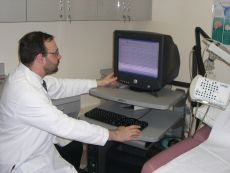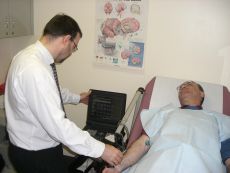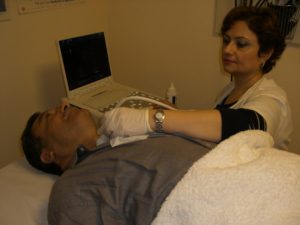 Diagnostic services offered and/or directly interpreted by Dr. Kolesnik include:
Diagnostic services offered and/or directly interpreted by Dr. Kolesnik include:
Comprehensive neurological examination is a physical examination that includes testing of various functions of central (brain and spinal cord) and peripheral (nerves, muscles) nervous system (including screening for hearing loss and loss of smell).
EMG (electromyography) and Nerve Conduction Studies (NCV/EMG). This is typically performed to determine the nature of various neurological symptoms including muscle weakness, numbness and pain. These symptoms may be associated with various neurological conditions such as nerve and muscle disorders, “pinched” nerves (radiculopathies, carpal tunnel syndrome, sciatica) and some other conditions. Recording electrodes are attached to your skin and a mild electrical stimulus is sent through your nerves and the responses are recorded. The second part of the test involves a small needle electrode, which is gently inserted into the muscle. The muscle will be tested at rest and tested as it contracts.
Electroencephalography (EEG) or brain wave recording. An EEG is a non-invasive analysis of the electrical activity of the brain. Small disc electrodes are placed on the scalp in various locations through which electrical impulse activity is recorded. Prolonged (24 to 72 hour) EEG testing could be performed at home (ambulatory EEG monitoring) or as inpatient (video-EEG monitoring). This is typically done for patients with suspected seizures, loss of consciousness or in patients with diagnosed epilepsy to determine the best treatment approach.
Videonystagmography (VNG) is the test to determine the nature of symptoms of dizziness, vertigo and gait abnormalities. This is typically performed in the office and takes less than an hour.
Ultrasonography/ Doppler studies. These procedures are part of vascular testing and typically done to exclude problems with blood circulation. Early and prompt diagnosis allows early intervention and prevention of major neurological problems such as stroke.
Carotid Ultrasound Examination. Carotid ultrasound is a non-invasive diagnostic examination used to evaluate the condition of the major arteries in the neck. These arteries, called the Carotid arteries, supply the brain with blood. During the exam, an ultrasound transducer will be placed on an area of the neck over the arteries, producing an image displayed on a video screen. This test will take approximately 30 minutes, and is completely painless.
Echocardiogram. Echocardiogram is a noninvasive diagnostic ultrasound examination to evaluate the heart chambers, valves, and function. It is done by placing an ultrasound transducer over the chest. The images are displayed on a video screen and typically recorded to a VCR tape. No preparation time is necessary of this examination.
Computerized memory and neuropsychological testing allows formal and objective way to evaluate patients with reduced concentration, mental fatigue, reduced memory and/or poor job performance.
PLEASE CALL US NOW OR MAKE AN APPOINTMENT ONLINE USING PROVIDED LINK ON THE TOP OF THIS PAGE.

